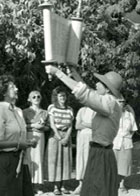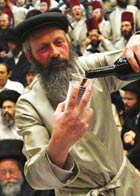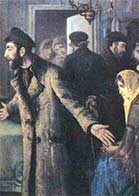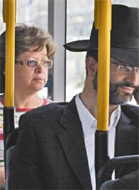Religion
 Holocaust Remembrance Day
Holocaust Remembrance DayFriday, April 9, 2010 | Jewish Ideas Daily » Daily Features
David Weiss Halivni sits in the National Library in Jerusalem working, as he has done for decades, on his multivolume commentary to the Talmud. His lifelong immersion in the Talmud began in his hometown of Sighet, in the Carpathian Mountains. In 1944, at age seventeen, he was sent with his family to Auschwitz and a series of labor camps, and emerged a lone survivor. After the war he made his way to New York's Jewish Theological Seminary, quickly establishing himself as one of the premier Talmud scholars of the age. Like most academic talmudists, Halivni approaches the text with a deep...
 The Messianic Aliyah
The Messianic AliyahMonday, March 15, 2010 | Jewish Ideas Daily » Daily Features
Today marks the rededication of the Hurva (literally, "ruin") Synagogue, once the jewel in the crown of the Jewish Quarter of the Old City of Jerusalem. Its history, and the debates over that history, open a window onto a fascinating chapter with powerful reverberations today. In 1700, days after arriving from Poland, a Jewish pietist purchased an abandoned plot known since the 15th century as "the Ashkenazi courtyard," hoping to build a synagogue. When his followers proved unable to keep up their payments, the Arab creditors reduced the site to rubble. In the 19th century it arose again, magnificently, thanks to the...
 Eruv
EruvOne of the more obscure municipal systems knocked out of commission by late February's blizzards along the Atlantic seaboard were eruvim. These, as the New York Times explained, are networks of poles and wires that construct symbolic boundaries around Jewish communities, thus enabling the observant to carry objects through outdoor public spaces on the Sabbath. The prohibition against carrying is of ancient vintage, attested in the book of Jeremiah (17:21-22): ". . . and bear no burden on the Sabbath day, nor bring it in by the gates of Jerusalem; neither carry forth a burden out of your houses." The Talmud (Shabbat...
 Rabbah
RabbahFriday, March 5, 2010 | Jewish Ideas Daily » Daily Features
Several weeks ago, a well-known Modern Orthodox rabbi in New York announced that a learned young woman serving in his synagogue as a teacher, preacher, pastoral counselor, and halakhic guide would henceforth be referred to as "Rabbah"—the feminine form of "Rav," or rabbi. In thus effectively ordaining Sara Hurwitz as the first female Orthodox rabbi, Avraham (Avi) Weiss set off a firestorm. The presiding body of ultra-Orthodox rabbis has ruled that Weiss himself must no longer be called Orthodox; the Rabbinical Council of America, an avowedly Modern Orthodox body, may expel him as well. No stranger to controversy, Weiss has bucked...
 Wine
WineFriday, February 26, 2010 | Jewish Ideas Daily » Daily Features
On Purim, which falls on Sunday, Jews are commanded, among other things, to drink. While all manner of intoxicants will do, pride of place has always gone to wine, humanity's favored escape from consciousness since the dawn of recorded time. Wine, the Psalmist wrote (104:15), "gladdens the human heart." That's not all it does—which may be why the Hebrew Bible has ten different words for alcoholic beverages. Wine was offered in the Temple in worship, refrained from by priests and ascetic Nazirites. The rabbis accorded it a prominent role in ritual, not only at Purim and Passover but also on the...
 Agunot
AgunotWednesday, February 24, 2010 | Jewish Ideas Daily » Daily Features
Ta'anit Esther, the traditional fast day preceding Purim, will be observed tomorrow. In recent years it has been designated as an international day of study, reflection, and calls to action on behalf of agunot, literally "anchored" or "bound" women. In biblical and talmudic law, a marriage is dissolved upon certain proof of a spouse's death or upon the granting of a divorce (get) at the husband's discretion. Each of these halakhic requirements can leave a woman languishing for years, tortured either by her husband's uncertain fate or by his malicious will. Though technically the term agunah is reserved for the former condition, it...
 Holy Societies
Holy SocietiesFriday, February 19, 2010 | Jewish Ideas Daily » Daily Features
In the Hebrew calendar, Sunday February 21 is the seventh day of Adar, the date traditionally marking the death of Moses on Mount Nebo, overlooking Canaan, alone with God. The Lord's personal oversight of Moses' interment, in a place "unknown to this day" (Deuteronomy 34:6), inspired the rabbis of the Talmud to praise the act of burying the dead with dignity as an expression of true (because unrecompensed) kindness and indeed of imitatio dei, the injunction to follow God's ways. So it is that the seventh day of Adar is designated by tradition to honor the institution of the Hevra Kadisha, the "holy society"...
 The Heart or the Head?
The Heart or the Head?Wednesday, February 10, 2010 | Jewish Ideas Daily » Daily Features
In recent decades, "brain death," the cessation of all neurological activity, has increasingly supplanted cardiac-respiratory failure as the most widely accepted medical criterion of death. This definitional shift has helped mitigate the often ruinous toll on families of caring for patients whose hearts can be artificially kept beating in the absence of even the simplest brain function. It has also saved lives, by facilitating the process of preserving and donating organs for transplantation. Fundamental to Judaism is the idea that human beings are created in the divine image. This affirmation of human dignity finds practical expression in the thoroughgoing prohibition on murder...
 Buses and Boundaries
Buses and BoundariesThursday, February 4, 2010 | Jewish Ideas Daily » Daily Features
This morning, Israel's Supreme Court reconvenes on the matter of "mehadrin" buses: public transportation in which women are expected, ostensibly on a voluntary basis, to enter from and sit in the back. The Court's hearing is in response to a decision earlier this week by the Transportation Ministry to grant formal recognition to such bus lines, several dozen of which now operate. Powerful segments of the ultra-Orthodox (Haredi) community argue that such segregation is the only way to insure appropriate modesty (tzni'ut) between the sexes. The degree to which Haredim in general agree with this position is not entirely clear, but the...
 Tikkun Olam
Tikkun OlamMonday, February 1, 2010 | Jewish Ideas Daily » Daily Features
If Israel's army was especially conspicuous during the early rescue and recovery efforts in Haiti, other Jewish agencies have been working on or behind the scenes as well. Among them is a coalition coordinated by the Joint Distribution Committee, the Jewish relief agency in continuous operation since World War I. According to the coalition's website, its Haiti-related work "demonstrates the age-old Jewish tradition of tikkun olam, or helping to repair the world." The phrase tikkun olam is indeed age-old, but its traditional meaning is very far from present-day connotations. The term originally appears in the second-century Mishnah to denote a specific set of...
Editors' Picks
A Safe Pair of Hands Jeremy Rosen, Algemeiner. Ephraim Mirvis is a good pastoral leader. But his appointment as Chief Rabbi in the U.K. testifies to the unwillingness of Britain's centrist Orthodoxy to challenge Haredi authority.
The Divine Comedy Shalom Carmy, Tradition. Religious people are primed to view their experiences in terms of happiness and suffering, reward and punishment. But what about the divine category of the joke?
The Six Commandments Ari Enkin, Torah Musings. If all of the Torah’s 613 commandments seem too much, relax: there are only six that a person must fulfill constantly to keep the evil inclination at bay.
The Road to Serfdom Daniel Kaganovich, Jeremy England, Times of Israel. Did Joseph rescue Egypt from disaster through government intervention, like a good Keynesian—or enslave an entire population to the State, like a good Keynesian?
The Soloveitchiks and Jesus Shaul Magid, Tablet. Yale’s new president descends from Rabbi Elijah Zvi Soloveitchik—who, unlike his cousin, Rabbi Joseph Soloveitchik, found much common ground between Judaism and Christianity.
Cue the Organ Benjamin Ivry, Forward. Once, churches forbade organs because they recalled Jewish Temple music in Jerusalem. Later, the Haskalah re-introduced the organ to synagogues—partly to drown out the cantor.
Swords Into Plowshares Jonathan Greenstein, Huffington Post. The owner of a Judaica auction house presents striking hanukkiot from Europe and India. There is also one from Israel, made from a rifle stock and dedicated by Yitzhak Rabin.
Hanukkah Stats Ran Abramitzky, Liran Einav, Oren Rigbi, Economic Journal. It had to happen: economists have subjected Hanukkah to regression analysis to determine whether or not the holiday is simply a Jewish Christmas. (2009)
Can A Woman Wear A Tallit? Michael J. Broyde, Torah Musings. Jewish tradition offers little precedent for a woman’s wearing tallit. But the idea that wearing one is an act of rebellion is even less well founded.
Branching Out Shmarya Rosenberg, Failed Messiah. Virtually every ancient image of the menorah depicts it with curved branches. So, why do Chabad’s hanukkiot have angled straight branches instead?

